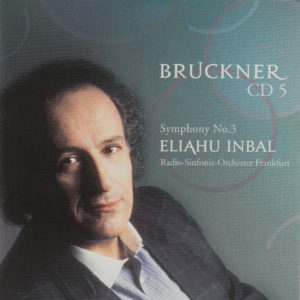 This morning, I am listening to Anton Bruckner’s Symphony No. 3 in D Minor WAB 103 (nicknamed “Wagner Symphony”), interpreted by Israeli conductor Eliahu Inbal (1936-).
This morning, I am listening to Anton Bruckner’s Symphony No. 3 in D Minor WAB 103 (nicknamed “Wagner Symphony”), interpreted by Israeli conductor Eliahu Inbal (1936-).
Prior to Day 3 I had never heard of Maestro Inbal, which means I got to research him while I listened. I love doing that.
His entry on Wikipedia tells me he,
…studied violin at the Israeli Academy of Music and took composition lessons with Paul Ben-Haim. Upon hearing him there, Leonard Bernstein endorsed a scholarship for Inbal to study conducting at the Conservatoire de Paris, and he also took courses with Sergiu Celibidache and Franco Ferrara in Hilversum, Netherlands. At Novara, he won first prize at the 1963 Guido Cantelli conducting competition.
Inbal has conducted a wide variety of works. He is best known for his interpretations of late-Romantic works, but is also noted as an opera conductor, and has given the premieres of a number of modern works.
Inbal’s orchestra is Radio-Sinfonie-Orchester Frankfurt, which Wikipedia tells me is,
…the radio orchestra of Hessischer Rundfunk, the public broadcasting network of the German state of Hesse. From 1929 to 1950 it was named Frankfurter Rundfunk-Symphonie-Orchester. From 1950 to 1971 the orchestra was named Sinfonie-Orchester des Hessischen Rundfunks, from then to 2005 Radio-Sinfonie-Orchester Frankfurt. For a long time the English translation Frankfurt Radio Symphony Orchestra was used for international tours, since 2015 the official international name is Frankfurt Radio Symphony.
The orchestra’s range of musical styles includes the classical-romantic repertoire, discoveries in experimental new music, concerts for children and young people and demanding programming concepts.
Here are the objective stats about today’s performance:
 Bruckner’s Symphony No. 3 in D Minor (WAB 103), composed 1873
Bruckner’s Symphony No. 3 in D Minor (WAB 103), composed 1873
Eliahu Inbal conducts
Inbal used the “First Version” (whatever that means), according to the back of the CD sleeve
Radio-Sinfonie-Orchester Frankfurt plays
The symphony clocks in at 65:30
This was recorded in Frankfurt, Germany, in September of 1989
Inbal was 46 when he conducted it
Bruckner was 49 when he finished composing it (the first time)
This recording was released on the Warner Classics & Jazz label/Teldec Classics label
Bruckner wrote his symphonies in four movements. The time breakdown of this one (Symphony No. 3 in D Minor), from this particular conductor (Inbal) and this particular orchestra (Frankfurt Radio Symphony) is as follows:
I. Gemäßigt, mehr bewegt, misterioso (Moderate, more animated, mysterious)……………………………………………………………………………………………………24:05
II. Adagio. Bewegt, quasi Andante (With motion, as if Andante)………………………………………………………………………………………………………..18:56
III. Scherzo. Ziemlich schnell (Fairly fast) (also Sehr schnell)……………………………………………………………………………………………………………..6:13
IV. Finale. Allegro (also Ziemlich schnell)………………………………………………………16:16
Total running time: 65:30
Here are the subjective aspects:
My Rating:
Recording quality: 3
Overall musicianship: 3
CD liner notes: 3 (very thin booklet, sparse essay about Bruckner translated into English, German, and French; no information at all about Eliahu Inbal)
How does this make me feel: 2
I can’t tell you how much this performance bores me.
Seriously. I spent the entire morning – some three hours – with this on repeat while I wrote e-mails, researched, posted to other blogs and FB groups, etc.
And not once did I think, “Wow. This is really cool.”
Not once did I sit up and take notice.
This entire performance is lackluster.
I didn’t even get excited by the Scherzo.
Ugh.
Also, I’m a stickler for information in liner notes. These notes are so sparse that they’re practically useless. And what is a “First Version”? Of what? Edited by whom? Published when? That’s just sloppy.
Whatever magic that these people thought was going into this performance obviously leaked out somewhere along the way.
One more thing. The tempo of the first movement seems double-time compared to the tempi of other conductors. Not kidding. The thrum, thrum, thrum of the strings sounds very brisk in Inbal’s interpretation, almost comically so. Like he’s playing a joke on us. Or the recording has been sped up (accidentally or on purpose).
Just FYI.
